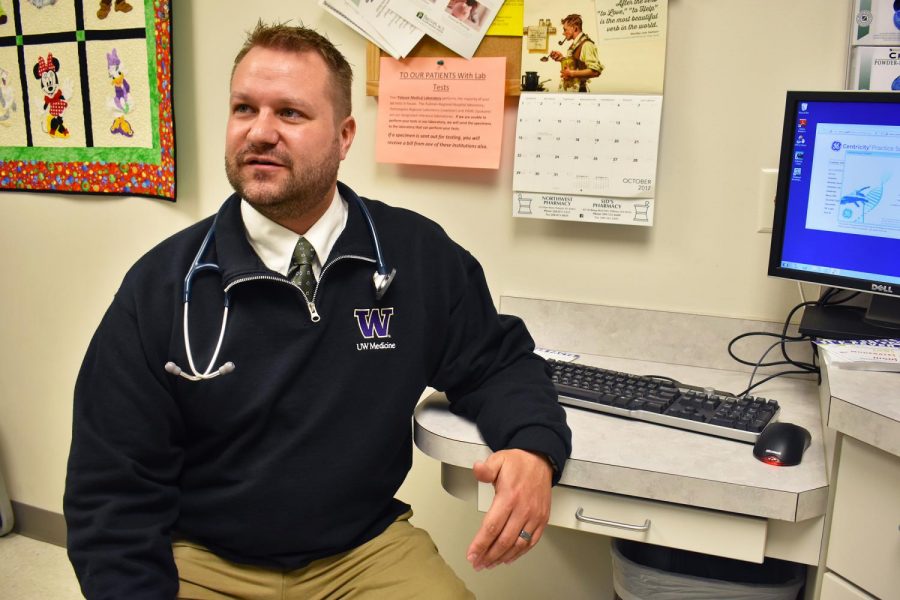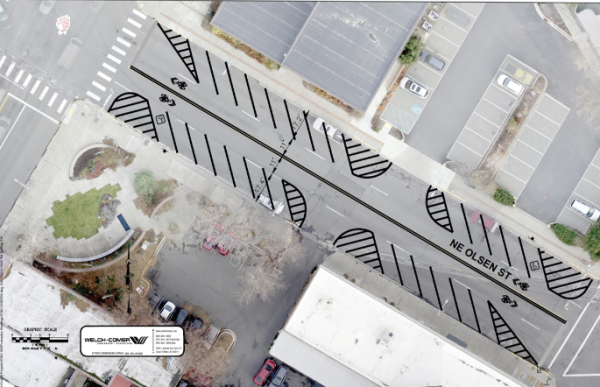Fever education focus of student project
Behavior more important than temperature in sick children, Rasmussen says
KEISHA BROKAW | The Daily Evergreen
UW Medical student Nick Rasmussen discusses his community project that aims to raise awareness of proper fever analysis and care by distributing thermometers and fever fact cards.
October 17, 2017
A University of Washington medical student is partnering with local groups to distribute thermometers and fever information to young families in Whitman County.
Nick Rasmussen, a second-year student from the UW School of Medicine, said his connection with the Palouse started with his involvement in the Washington, Wyoming, Alaska, Montana and Idaho Educational Program at the University of Idaho.
This past summer he joined a volunteer program called the Rural Underserved Opportunity Program to address the health needs in the community.
“Families with infants,” he said, “small children that maybe don’t have the means to go buy their own thermometer or aren’t thinking of having a thermometer in the house.”
Rasmussen said his project was designed with new families in mind. He said the fever fact cards he distributes have information parents need, such as the most effective location to take a child’s temperature, which varies depending on their age.
“Each new mother at Pullman Regional Hospital will get one of these fever fact cards in their hospital literacy packet that’s put together by Neill Public Library,” Rasmussen said.
He came up with the idea when he was a physician’s assistant for five years prior to medical school.
“As a PA when I saw patients,” he said, “a lot of parents would bring their kids to the doctor and not know if they had a fever or not when they were sick.”
Rasmussen said he noticed how communities were unaware of the advantages of fever education, and decided it was time for a change when he had to come up with his project.
“When you’re a medical provider treating a sick kid,” he said, “fever matters.”
Rasmussen added that fever education is important to the community. He said taking Tylenol or Advil isn’t the first solution one should take when facing a fever.
“Fever is your body’s natural antibiotic,” Rasmussen said, “so it’s fine to let a fever just run its course as long as your symptoms aren’t too bad.”
Rasmussen added that temperature isn’t the main factor determining whether a child needs to be taken to the doctor.
“A lot of people think if I have a 105 fever, somehow it’s worse than having a 101-degree fever,” he said. “That’s not true. Especially for a kid, it’s more how the child’s acting that’s important.”
Rasmussen noted that he relied on his community partners — Pullman Regional Hospital, which donated 750 thermometers, and the Community Action Center connected him with families that receive supplemental food through Women, Infants and Children, who may need thermometers.
He said Jeff Guyett of the Community Action Center gave him the idea to distribute the thermometers and introduced him to Troy Henderson of Whitman County Public Health, who he said was a key figure in connecting him to families on WIC.
However, Rasmussen said he looked at other community partners, such as the Thrifty Grandmothers of Colfax who donated 200 thermometers, because he felt like there were more families who could benefit from his project.
Rasmussen said he wanted to create a project that would benefit the health care of the community.
“I just wanted to come up with a way to encourage the use of thermometers,” he said, “and get more thermometers in the community, and then also improve the health of children.”





















